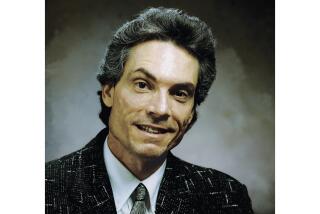Jheryl Busby dies at 59; music executive led revival of Motown Records
- Share via
Jheryl Busby, a music executive who led a revival of Motown Records while president and chief executive of the company from 1988 to 1995, was found dead Tuesday in a hot tub at his home in Malibu. He was 59.
FOR THE RECORD:
Jheryl Busby obituary: The obituary of Jheryl Busby, former president of Motown Records, in Thursday’s California section incorrectly stated that Stax Records was defunct. The Concord Music Group revived the Stax imprint in 2007.
“It appears it could be a possible accident, or he died of natural causes,” Ed Winter, a spokesman for the Los Angeles County coroner’s office, said Wednesday. An autopsy was planned.
Busby got his start in the music business doing promotional work for now-defunct Stax Records in the early 1970s.
“I thought it was such a great job,” Busby said in an interview with the Washington Post in 1991. “It was going in stores, educating the store owner on what records you had coming out, and trying to get merchandise space. It was mom-and-pop stores -- little small black stores -- and your job was putting up the posters and creating a buzz on records.”
He was so successful at stirring up interest in his label’s acts that he quickly moved on to promotional and artist development roles at Casablanca, Atlantic, CBS and A&M Records.
At his next stop, MCA Records, Busby rose to become president of the company’s black music division by 1984. He made a priority of signing established performers, including Patti LaBelle and Gladys Knight, who had lost their record company deals in the post-disco era.
He also helped discover and market such groups as New Edition, Jody Watley, Bobby Brown, and the Jets, helping them cross over from the R&B music charts to the more mainstream top 40 lists. Along the way, he turned MCA into the industry’s black music sales leader.
In 1988, he was hired at Motown, the legendary black music hit factory founded by Berry Gordy Jr. in Detroit in 1959. The company had been in decline since uprooting operations and moving to Los Angeles in 1972.
Gordy sold the company in 1988 for $61 million to a partnership of MCA Records, the distributor of Motown’s music, and Boston Ventures, an investment group. Busby took over as Motown’s president and chief executive, gaining a 10% ownership stake in the process.
“I thought it couldn’t get any better: president and CEO of probably the most important record label in America in terms of black music,” he told the New York Times.
Building on stalwarts Lionel Richie and Stevie Wonder, Busby brought Diana Ross back to the label after several years away. Then he started developing new acts, including Boyz II Men, Queen Latifah and Johnny Gill.
Busby’s magic touch was evident. In 1990, Motown had five songs reach No. 1 on the R&B charts, and sales of the company’s LPs jumped from No. 10 to No. 4 on the R&B album charts.
“I had tremendous respect for the way he continued the Motown legacy,” singer/songwriter Smokey Robinson, who had a string of Motown hits starting in the 1960s, said in a statement Tuesday.
But Busby was forced out in 1995 after a legal dispute with MCA. Three years later, he was named head of the urban music division at Dreamworks SKG.
In 2004, he founded Def Soul Classics Records, signing standbys LaBelle and the Isley Brothers, and two years later continued his partnership with LaBelle by starting Umbrella Recordings.
Busby also became a majority stakeholder in Founders National Bank, the first African-American-owned and operated commercial bank in California, in 1998. He remained a backer after several mergers with other black-owned banks and, at the time of his death, was vice chairman of the board of directors of OneUnited Bank.
Born May 5, 1949, in Los Angeles, Busby attended Cal State Long Beach and worked as an inventory clerk at Mattel Toys before climbing the ladder to new-toy coordinator.
Information on survivors and services was incomplete.
Noland is a Times staff writer.
More to Read
Start your day right
Sign up for Essential California for the L.A. Times biggest news, features and recommendations in your inbox six days a week.
You may occasionally receive promotional content from the Los Angeles Times.






